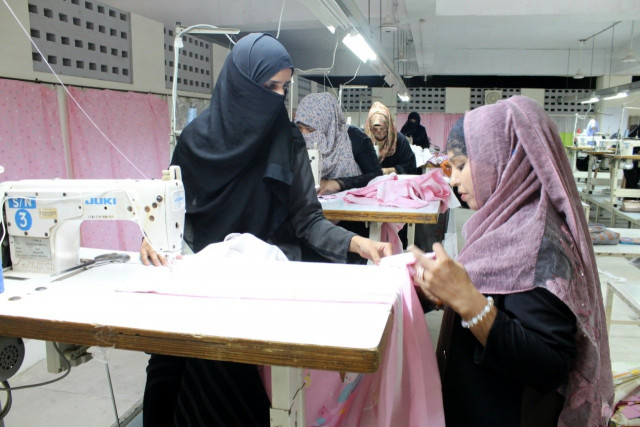Stitching her way to a better life
Through sheer dedication, Raeesa Qamar changed her circumstances

One woman who broke the glass ceiling is Raeesa Qamar, who despite all the setbacks in her professional and personal dealings, refused to give up. Today, she supervises dozens of women at a garment factory. But what is truly inspirational is her journey - how she navigated the highs and lows that she encountered on a daily basis as she struggled to realise her dream.
How this girl’s refusal to make roti enabled her to write her own story
Early life
With her father having passed away before she was born, Raeesa’s childhood was marred with financial instability. She could only complete her education till the intermediate level and was married off at the age of 18.
The marriage itself was an unhappy one and a decade later, Raeesa couldn’t take it any longer. She filed for divorce and in the process, lost the fight for the possession of her four children to her estranged husband.
At this point, Raeesa had no roof over her head and no one to turn to. Her mother, who hailed from Gujranwala, had returned to live with her brothers. “I chose to stay in Karachi and face my circumstances,” she tells The Express Tribune. Raeesa had been fond of stitching and embroidery from a young age and started making clothes for women in her New Karachi neighbourhood to meet day-to-day expenses. She even started conducting stitching classes for children to make a little extra money.
Opportunity in adversity
With rising inflation and the prices of essential commodities increasing almost on a daily basis, Raeesa found it hard to make ends meet despite working overtime. It was at this point that she realised that she would have to enhance her skillset. In doing so too, the young woman would have to face several problems, not least of which was the non-availability of a proper transport system.
Despite these barriers, Raeesa started attending stitching classes at a community centre in FB Area. Here too, she found the skill set being taught to be too primitive.
Desperate for a fresh opportunity, Raeesa decided to shift to Malir, where she had heard a new niche had opened up for designer boutiques. Soon, she found a job at a local boutique. “I still wasn’t happy, though,” she reminisces, “for the dream was to own a boutique where I could sell modern dresses at affordable prices.”
Grave concerns of a gravedigger
The learning process
With the idea firmly lodged in the back of her mind, Raeesa would keep looking for opportunities to update her skillset. Soon, she came to know of Aman Tech, which provided technical training to underprivileged youth.
The training sessions are free-of-cost and Aman Tech also provides pick and drop services to women. Raeesa enrolled in the six-month stitching and dress-designing course, but managed to complete the lessons in only four months.
Soon after completing the course, Raeesa was offered a job in a garments export factory. She started out as a worker in the stitching department, but the company soon promoted her to the supervisor’s position. The initial salary offered to Raeesa was Rs26,000, which was upgraded to Rs35,000 after just three months. The general staff working under Raeesa’s supervision are paid Rs16,500 a month.
Life lessons
“I was always fond of wearing beautiful dresses but my family’s financial circumstances didn’t allow me to buy any,” she says. “There are countless such women and girls like me who cannot afford to wear modern dresses,” she adds. Instead of feeling sorry for herself, however, Raeesa resolved to work hard and make her own dreams come true.
Not only this, she also vowed to open her own boutique, where she would give stitching classes to provide women with a source of income and also enable them to purchase fashionable dresses at low prices. “The way a person dresses is their identity,” she remarks.
For Raeesa, who is now 33 years old, it is not necessary to spend hefty amounts to purchase fashionable clothing. “Why can’t women belonging to low-income groups design and stitch their own clothes?” she questions.
With this idea, Raeesa started selling her self-designed dresses to women in her neighbourhood. Her dresses were an instant hit and soon, orders started flying in.
Opportunities galore
For Raeesa, a city like Karachi affords plenty of opportunities for women to prosper, provided they are willing to cross the initial bottlenecks and willing to put in the hard work. “Sure, there are issues like unavailability of transport, unavailability of small loans and other social obstacles,” she says.
“Women can set up small factories at their homes if they are provided small loans on easy instalments,” opines Raeesa. A small home-based setup would hardly cost more than Rs25,000, including the machinery and initial inventory.
Who will share his load? 25 years of service and no benefits to look forward to
As far as sales are concerned, says Raeesa, the internet has made it very easy. “Several women working in the factory with me are making money on the side by stitching clothes at home and selling them via Whatsapp groups and Facebook pages,” she says.
For Raeesa, the trick is to know your weakness and turn it into your strength. “I tell women not to let the highs and lows demotivate you,” she smiles. “Take small steps, but never give up. For me, it was Aman Tech that provided a new hope.” Such organisations, she says, can curb poverty and bridge the disparity between the have and have-nots, if established across the country.












1724319076-0/Untitled-design-(5)1724319076-0-208x130.webp)






COMMENTS
Comments are moderated and generally will be posted if they are on-topic and not abusive.
For more information, please see our Comments FAQ